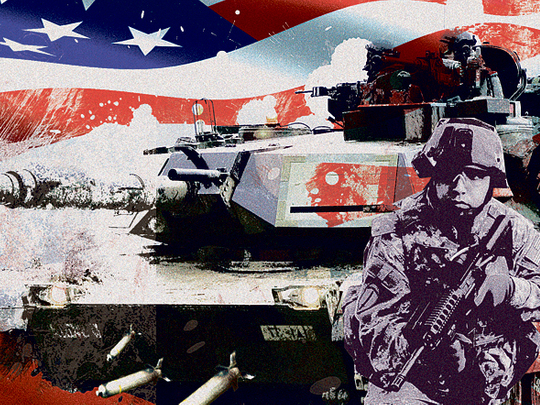
Passion burns cold in Washington these days at the turn events have taken. "And I will not tolerate it", thundered President Barack Obama as he called for greater oversight by the intelligence community over the flow of suspect foreign nationals into the US.
After the 9/11 terrorist attacks revealed the soft underbelly of the US, the shoe-bomber and, more recently, the underwear bomber on Christmas Day have only made things worse. (Not my fault that Americans have a penchant for choosing pithy monikers for terrorists.)
Then there was that suicide bomber, a Jordanian double agent, who killed seven CIA operatives at their base in eastern Afghanistan. To complicate matters further, a new front is shaping up in Yemen, where the Obama administration has ramped up military aid, counter-terrorist action and drone strikes, though the Yemeni government declared that there are "limits" to its cooperation with the Americans.
It remains to be seen whether the US can accomplish in Yemen, what it has failed to accomplish in Iraq, Pakistan and Afghanistan: take early action to prevent Al Qaida from forming a credible force in lawless regions.
What does it all mean? Is Obama, much to our consternation, turning into yet another war president?
As it enters the second decade of the new century, the US clearly continues to hold a hegemonic position in the world, enjoying unimaginable military might, technological dynamism and economic weight.
Yet the exercise of that enormous power, since America's emergence as a functioning emperium beginning, say, with William McKinley in the 1890s (who took the accidental explosion of the battleship Maine as an excuse to declare war on the Spanish colonies) right down to George W. Bush (who took his country to a manifestly fraudulent war in Iraq), was always badly conceptualised and executed.
A hegemonic ethos continues to define US foreign policy. It lies behind all aggressive White House decisions and congressional initiatives to impose sanctions on recalcitrant governments, or ‘rogue states', that are not sufficiently responsive to American demands.
How the democratically-elected Hamas government was pauper-sided by the US Treasury department, crippled by sanctions and finally overthrown by CIA machinations not long ago provides a stark example of this intellectually and morally bankrupt posture.
The justification for that posture is that America, and along with it the European industrialised nations, has a ‘duty' to improve humanity's lot — even where that requires military action, and intervention by the boys from Langley in the internal affairs of countries as far apart as Iran in 1953 and Chile in 1973.
Leaders in the Euro-American world know what is best for other peoples, other nations and other polities, that are less endowed than they are. They stand taller than us. They scan horizons beyond our vision. And they have every right to be intolerant of miscreants and impatient with contrarian voices — as if it is unusual for superpowers to invite opposition and resentment by the world's poor and powerless.
What are we to say to these antiquated, anti-historical notions about the white man's burden, la mission civilizatrice, foisted upon by these folks who speak openly of ‘Islamo-fascism' and ‘Islamic terrorism'? Folks whose own modern history caused some 80 million deaths in the great European wars between 1914 and 1945?
It takes no psycho-historian to determine that that bloodbath was the inevitable terminus of 400 years of colonial rule over the ‘subjugated peoples', millions of whom were robbed, murdered, tortured, and worked to death, all with efficient calm, in the colonial outposts of the British, French, Dutch, Portuguese, Italian and Belgian empires.
Learning no lessons
This barbarism (for what other word would you choose here?) grew out of the very core of the Western body politic. The dessemination of humanistic ideas proved no barrier to wanton brutality. That barbarism grew, root and branch, in the very homeground where Renaissance culture was born, as if the best ideas that had been written, thought and imagined by European thinkers left no discernible impact on those who encountered them.
Those who ran Belsen (a Nazi concentration camp in Germany) then, and those who ‘rendered' human beings for torture more recently, had been reared on the Western intellectual tradition. None of it, it appears, ever sunk in.
The US opening a new front in Yemen? Oh, peleeeeze! Those beating the drums of war may, like Robert Duval in Francis Ford Coppola's Apocalypse Now, ‘love the smell of napalm in the morning', but a war in Yemen, yet another enigmatic country with a culture difficult to fathom, will not work out in Washington's favour.
It will not work out because men of colour, ‘peasants in black pyjamas', if you wish, are as fiercely protective of their turf and their freedom as anyone else.
Martin Sheen, that other actor in Coppola's iconic Vietnam movie, reflects on ‘Charlie' — the name Americans gave the Vietcong enemy — before he embarks on his journey into the heart of darkness to "terminate Mr Kurtz with extreme prejudice".
"Every minute I get weaker", he muses. "And every minute Charlie squats in the bush, he gets stronger". Maybe it's true after all that white men can't jump.
Fawaz Turki is a veteran journalist, lecturer and author of several books, including The Disinherited: Journal of a Palestinian Exile. He lives in Washington D.C.








